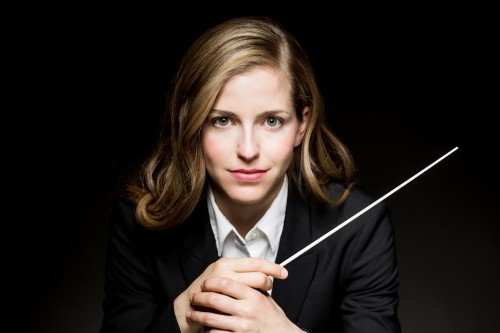 United Kingdom Bach, Mendelssohn: Benjamin Marquise Gilmore (violin), Scottish Chamber Orchestra, Karina Canellakis (conductor), City Halls, Glasgow, 14.12.2018. (GT)
United Kingdom Bach, Mendelssohn: Benjamin Marquise Gilmore (violin), Scottish Chamber Orchestra, Karina Canellakis (conductor), City Halls, Glasgow, 14.12.2018. (GT)

Mendelssohn – Calm Sea and Prosperous Voyage; Symphony No.5 in D ‘Reformation’
Bach – Violin Concerto in E major BWV 1042
Bach (Webern) – Ricercare from A Musical Offering
This closes the year for the SCO and also the orchestra’s three evenings devoted to the music of Felix Mendelssohn, as well as his association with those composers that he was influenced by, here namely J.S. Bach. Certainly to open with one of his most popular pieces with its allusions to his visits to Scotland was a nice opening to this concert, however the Bach Violin Concerto seemed not to have so many links, apart from Mendelssohn’s proselytising of Bach’s music in Leipzig.
The young New York conductor Karina Canellakis had already established a career as a solo violinist before she was advised to take up the baton by Sir Simon Rattle and since winning the Solti prize in 2014 she has developed a fine career in which she will assume the conductorship of the Netherlands Radio Philharmonic Orchestra next year. Her gestures are broad and expansive, sometimes taking up the baton, sometimes discarding it. She has a tall elegant figure standing above the orchestra, but sometimes she appears to lack emotional drive in her work.
The opening of Mendelssohn’s Calm Sea and Prosperous Voyage seemed to be overly calm and rather serene for any sailing vessel, the playing was fine, but the momentum did not arrive until several minutes had passed; the colours of the piece superbly performed by the woodwinds and reinforced by the period timpani. Throughout we heard some particularly fine playing by the strings. This was rather a rather inauspicious beginning, however with the E major Violin Concerto, we heard the best playing of the whole evening: with Canellakis retired, the Violin Concerto was played by Benjamin Marquise Gilmore and ably assisted by associate leader Stephanie Gonley. The degree of performance was of the highest order, Gilmore revealed outstanding musicality bringing out the bright upbeat mood in the opening Allegro movement, opening with a bright triad, and setting up the whole performance on a festive note. Gilmore’s playing was marvellously musical in the grace and harmonies with stirring playing from the continuo, the disposition of this work more Germanic and unlike conventional Venetian style, whilst the Adagio – somewhat melancholic – in three/four time, was magical in sensitivity and lyricism, and in the Allegro assai, the soloist reprised the upbeat exuberance with the rhythm of a passepied in the baroque style taking this marvellous work to a bright close, with the catchy tune returning after a breath-taking pause. This was quite exquisite playing, by soloist and the SCO and it seemed – as I have often thought – no conductor was required, so gifted are these musicians.
The version of Ricercar a 6 by Anton Webern (1935) employs the Klangfarbenmelodie style – the exchange of the melody between the string groups assuming colours of each instrument – and was an unusual choice in this concert. It appeared wholly appropriate with the American conductor once again taking control, albeit I thought some of her mannerisms were too exaggerated for this music. This was elegiac, almost unworldly playing, excellent again from Gilmore back in his customary place as the leader of the orchestra, and it was a pleasure to listen to the flowing harmonies.
Mendelssohn’s ‘Reformation’ Symphony opened nobly with magnificent playing from an enhanced brass section and the great ‘Dresden Amen’ heard in the strings. The second idea was introduced briskly, infusing drama and allowing free expression of melody. The B flat major scherzo was noticeable for bright cheerful playing by the woodwind and stridency in the violins. In the Andante, we heard an achingly beautiful passage from the violins, resplendent in the tonal colours of the returning ‘Dresden Amen’ and the brass was quite magnificent. The Finale – with its invoking of ‘Ein feste Burg ist unser Gott’ – was rip-roaringly resplendent with the excellent brass on top form once again. The orchestra was on a high to bring this series devoted to Mendelssohn to a fitting and celebratory close as Martin Luther’s chorale was heard in celebratory and appropriately festive mode.
Gregor Tassie
